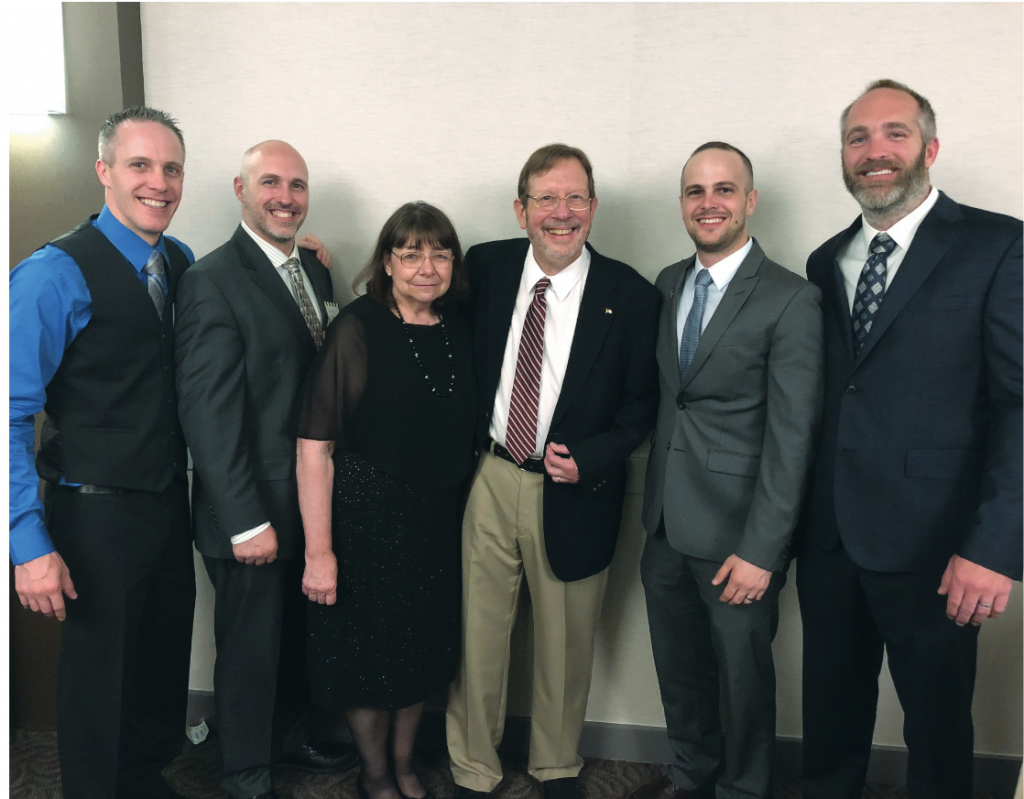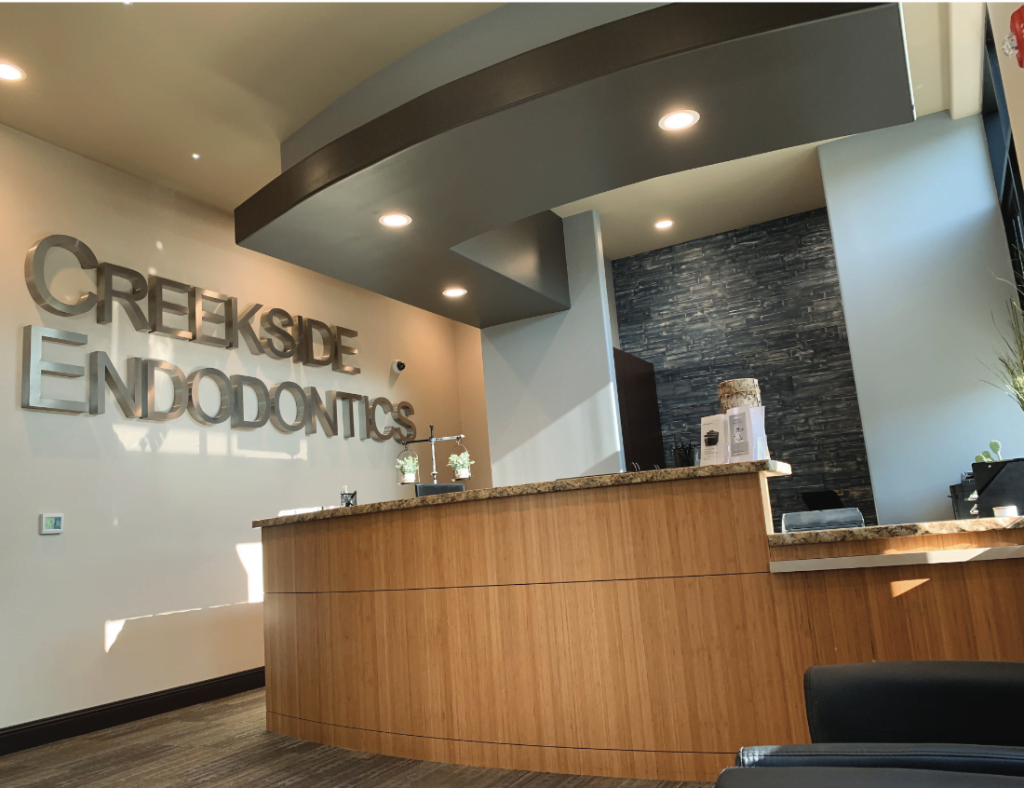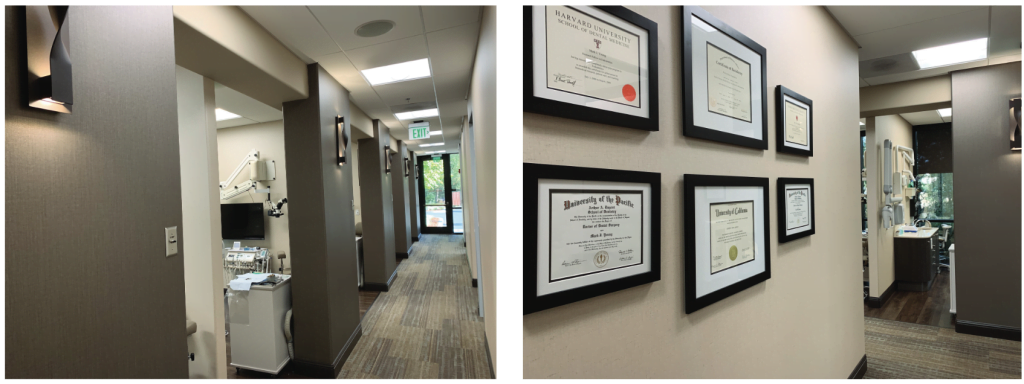Editor’s intro: When endodontist brothers practice together, they build their strengths into a thriving practice.
Jeremy Young, DDS, MMSc; Mark Young, DDS, MMSc; Eric Young, DDS, MMSc; and Scott Young, DDS, MMSc
What can you tell us about your background?

We grew up just south of Sacramento in Elk Grove, California. We didn’t have much, and our parents really instilled in us the importance of hard work and doing a good job. We all had jobs, starting with a paper route for the Sacramento Bee, and then we each had various entry-level jobs throughout high school. Our parents made sure that we always gave our best effort in everything we did, and while they never expected perfection, they made it clear that we were capable of accomplishing anything we put our mind too.
Our older brother, Jeremy, was a phenomenal basketball player but ended up hurting his back in high school, which pretty much ended his serious playing. He decided he wanted to coach basketball, and our mom encouraged him to be a dentist, so he could be his own boss and set his hours. One by one, each of four brothers ended up going into dentistry and then eventually into endodontics.
When did you become specialists and why?
Mark finished his residency in 2009 and Eric in 2015 after doing his residency in the U.S. Army. Scott completed his residency in 2018. All of us are very detail focused, and during dental school, we all explored the various specialties extensively. Treating patients in pain became a focus for each of us, and most of us explored oral and maxillofacial surgery (OMFS) as an option, but each ultimately decided we would rather save teeth than extract them.
Is your practice limited solely to endodontics, or do you practice other types of dentistry?

Our practice is limited to endodontics, and it has kept us plenty busy.
Why did you decide to focus on endodontics?
We have focused on endodontics as a specialty where our capability in diagnosis and technical skills is put to the test every day.
Do your patients come through referrals?
About 95% of our patients come from the referral of general dentists. The remaining patients come from word-of-mouth referrals from family and friends of previous patients. When we initially started, we had only one office with a few referring physicians. However, as we focused on differentiating our practice on quality, we now have five offices and almost 1,000 referring physicians.
How long have you been practicing endodontics, and what systems do you use?

Mark started Creekside Endodontics in Folsom, California, in 2009. When Eric graduated, he partnered with Mark and opened a new location in Roseville, California, in 2015. They opened a practice in Sacramento in 2018 and Auburn in 2019. Jeremy started Young Endodontics in Grass Valley, California, in 2005 and will be merging with Creekside Endodontics in late 2019.
We use the metric system for measurement of canal lengths in millimeters and other treatment-related measurements, but we also use the imperial system of units while discussing the area of the office in square feet or temperature in degrees Fahrenheit.
What training have you undertaken?
We each completed our endodontic residency training at Harvard. While serving in the U.S. Army, Eric was trained in Advanced Trauma Life Support and became certified in dental forensics.
Who has inspired you?
Our parents have been a great inspiration in always doing good work and also in putting their children first. They focused on our education and made every effort to help each of us have the greatest opportunity. They truly embodied the idea of servant leadership in the household every day for us growing up.
What is the most satisfying aspect of your practice?
Taking patients out of pain is definitely the most satisfying part of our practice. Unfortunately, we spend too much time dealing with patients suffering because their previous RCT was substandard. That’s why we made quality the backbone of our practice. It’s great to be able to fix these problems, but it would be even better if we were able to treat them properly in the first place. We try to take time with all our patients to educate them on how to better assess the quality of their own dental care. We believe if patients take a more active and more educated role in their dental care, they can avoid a lot of pain and suffering in the first place.
Professionally, what are you most proud of?
We take a great deal of pride in the quality of work that we do, not just because we’re passionate about doing good dental work, but because we take enormous pride in being able to help restore patients to peace and health. Going that extra mile, doing quality work that the patient may never appreciate means we not only can help relieve their suffering today, but also do good quality that will last them a lifetime, not just until their next visit.

What do you think is unique about your practice?
From the beginning, we agreed that we wanted to differentiate our practice on quality and transparency. We made sure to go that extra mile to do great clinical work, even if the patient couldn’t perceive the difference. We wanted to take pride in our work. Transparency also meant taking extra time to talk with patients and educate them on their teeth, the work being done, and how they can also assess good quality. For us, an educated patient who takes an active interest in his/her dental care is the best patient. And we work hard to serve all patients well.
Sometimes focusing on quality and being transparent has meant telling a patient we can’t help him/her and recommending extraction. While this isn’t financially good for us in the short term, we feel that it builds more trust and has helped us grow our business in the long term.
By far, the most unique thing is that all four of us brothers are partners. It was always a dream of ours to practice together, and by the end of 2019, we will finally all be practicing under the Creekside Endo-dontics banner. A lot of people say working with family is trouble, but we get along great and have learned how to work together to solve difficult problems. We have had to make some hard decisions along the way, but we have always put our relationship as brothers ahead of any selfish interest. When we stop thinking about ourselves primarily, we can focus on what is good for the business at large. Happily, most of the time what is best for the business is also good for the individuals in the practice.
What has been your biggest challenge?
Starting Creekside Endodontics was a huge challenge. It took a long time to figure out how to grow from nothing into a thriving practice. Another challenge we faced as we started to grow past two offices was establishing systems to manage a large practice with multiple locations while still maintaining quality and transparency. A lot of the systems used to run a single office don’t scale when managing multiple practices. And it’s easy to lose quality as you add more staff and new systems. That’s why we’re so hands-on with our teams and make sure to review cases and touch base with our doctors.
What would you have been if you didn’t become dentists?
While each of us loves our chosen profession, each of us may have taken a separate path if events had unfolded differently. Eric would have pursued a career as an officer in the U.S. Army. Mark would likely be the CEO of a corporation, and Scott would be saving lives as a firefighter after a stint in the U.S. Navy.
What is the future of endodontics and dentistry?
The future of endodontics and dentistry is transparency. The proliferation of digital records in the era of social media and online resources have created an environment where patients seek information and guidance with ever greater degrees of sophistication. Patients are also facing expanding choices in dental care and can be even more mobile as digital records are easily shared.
As clinicians, we will be pressed to deliver excellence in every patient encounter. If we offer quality and transparency with each interaction, patients can share that experience easily, and our business and profession will grow. However, the reverse is also possible; if we fail to offer quality and transparency, patients will demand change either by seeing a new dentist or by broader industry changes.
What are your top tips for maintaining a successful specialty practice?
Maintaining high standards for both clinician and staff is one critical step in a successful practice. Small compromises add up over time and can gradually erode the foundation of the practice. When you and your staff know that quality is important, that it will be monitored and rewarded, they will deliver and continue to excel over time.
What advice would you give to a budding endodontist?

Remain humble, and do your best every day. As trite as it sounds, it’s easy to fall into the routine and monotony of daily practice. It’s easy to look at patients as “customers” or numbers, but each one is an individual deserving of your best. Remember how fortunate we are to be in this profession. We are honored that patients come to us and trust us in their hour of need. We have a duty to treat each patient to the best of our ability.
What are your hobbies, and what do you do in your spare time?
Eric enjoys serving as the family BBQ pitmaster when out of the office. Mark may be found chasing five small children around the house. And finally, Scott has become a novice carpenter engaged in myriad home improvement projects.
While these endodontist brothers gain momentum from each other, Dr. Richard A. Munaretto found his inspiration from his father and uncle. Read more about his practice here.
Stay Relevant With Endodontic Practice US
Join our email list for CE courses and webinars, articles and more..

